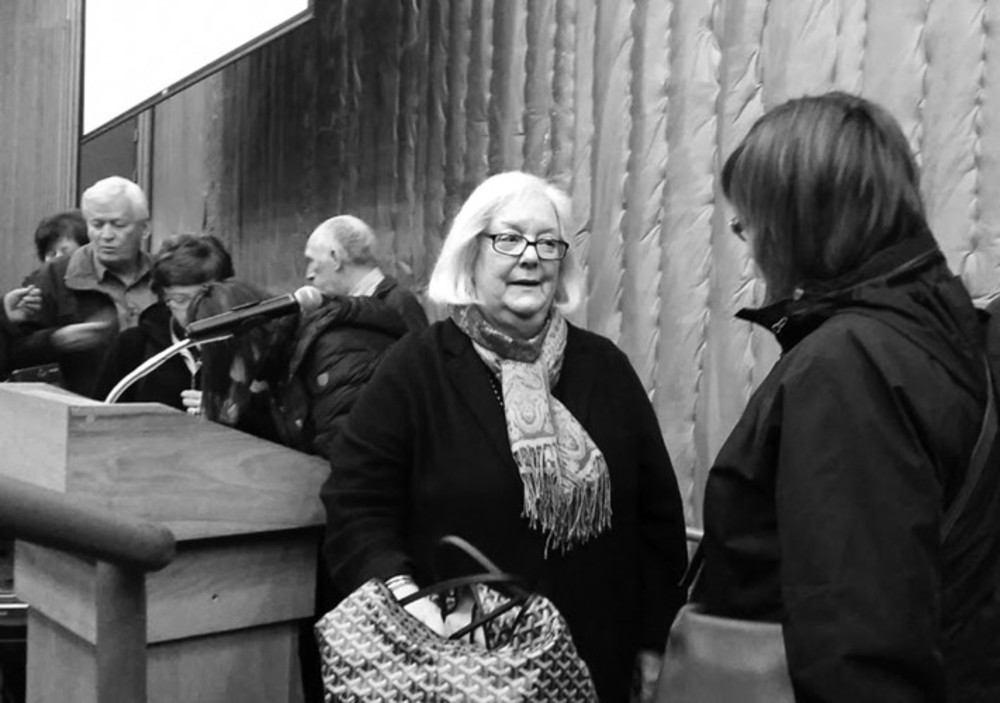Holocaust survivor reminds us of the need to forgive
 Louise Lawrence-Israëls, left.
Louise Lawrence-Israëls, left.
Even though we are regularly saturated with messages of love, and it’s generally understood that hatred is essentially poison of the soul, sometimes it can be really hard not to hate. While it is a normal part of life, it is something we should strive to limit as much as possible. And if someone who survived the Holocaust can do it, perhaps others can work at reducing hate. In the words of Holocaust survivor Louise Lawrence-Israëls, “we must end the circle of hate.”
Lawrence-Israëls, now in her 70s, spoke last week at Bristol Community College’s Fall River campus during a program organized by the college’s Holocaust Center. Lawrence-Israëls, who was hidden away at 6 months old and didn’t reemerge into the world until the war’s end, when she was 3, addressed a packed multigenerational audience in a lecture hall in BCC’s Jackman Arts Center.
The Holocaust Center’s director, Ron Weisberger, briefly introduced Lawrence-Israëls before she approached the podium. With a steady, calm voice, she shared her story of living in an attic in the Netherlands during the final years of World War II. She first told of her great respect for her parents, who did everything in their power to keep the family safe.
She told how she learned to speak quietly by mimicking the lowered voices and frequent silence of her parents, how her parents kept her and her brother occupied by teaching them to read and write, and of her brother’s birthday gift of letting her play with his favorite toy for the day, a simple white pull horse on wheels that meant the world to him. She told of how her father would regularly leave the apartment to get food, other necessities and news – needless to say, a huge risk in Nazi-occupied territory.
Immediately after their liberation, Lawrence-Israëls recalled that she and her brother were told: “You’re free. Now play outside – have fun.” American soldiers greeted them, holding chocolate in outstretched hands. She recalled that her brother asked their parents if they could go back outside the next day because he wanted more chocolate.
When people have experienced what her family did during the war, hatred is a possible outcome. During Lawrence-Israëls’ upbringing, this was a part of her world. She found herself adopting the beliefs of her parents, just as she adopted their silence as a toddler. She only realized the ripple effect her beliefs were having when her young daughter approached neighbors and repeated some less-than-kind words she had heard from her mother. This, Lawrence-Israëls said, is when she realized she had to “reverse the hatred.”
“You can’t go through life with that kind of hatred. It all started with that four-letter word: hate,” she says. “I don’t blame the younger generation. It’s not their fault.”
One of the most important universal messages is to forgive; without forgiveness, we can’t move on. We can’t heal from the poison of hatred, and therefore we can’t grow. But sometimes, forgiveness is indescribably difficult, and as much as one can preach the concept, it isn’t always easy to know whether you would actually be able to do it in any given situation.
But knowing that Lawrence-Israëls could forgive provides optimism that anything is forgivable. As Weisberger said, “seeing and hearing from a survivor always makes an impression that you can’t get any other way.”
Forgiveness is a two-pronged approach to enabling growth. The forgiver forgives, and that is important. But forgiveness also allows the person or people needing forgiveness to continue on their path back to righteousness.
Some have observed, in the media and elsewhere, that this generation of German youth has not felt the forgiveness they need; they feel blamed for the actions of a generation far-removed from their own. Messages like Lawrence-Israëls’ could be the ones they need to hear in order to know that they are more than what they think the world thinks they are: they are humans, too.
Centers like the one at BCCare crucial to not only helping us to never forget, but also for acting as a medium for messages like Lawrence-Israëls’.
The BCC Holocaust Center has been in operation for three years. It houses materials from the Jewish Federation of Greater New Bedford and works with their Holocaust Education and Memorial Committee. The Holocaust Center has hosted dozens of speakers and has become home to DVDs, books and other materials on the Holocaust and other genocides.
For 13 years, Weisberger and his colleague, Howard Tinberg, have been teaching a class that is part of the BCC Honors program called “Remembering the Holocaust in Literature and History.” The course often utilizes the resources of the center in its curriculum.
ARIEL BROTHMAN is a freelance writer who lives in Wrentham, Massachusetts.







